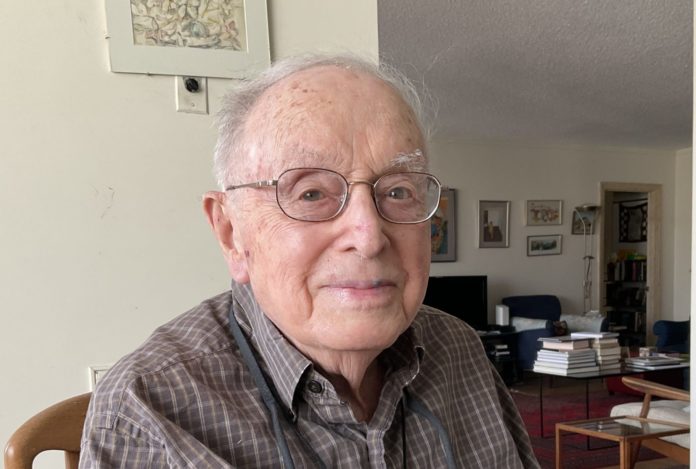Celebrating muckraker Morton Mintz’s 100th birthday
Morton Mintz is turning 100 today, a good excuse to briefly review his extraordinary career as a pioneering hero of investigative reporting in medicine and public health.
As a reporter at the Washington Post for 30 years – from 1958 to 1988 – Mintz relentlessly exposed corporate crime and misconduct, particularly in the drug, tobacco and automotive industries.
In 1962, Mintz broke the story of the consequences of using thalidomide, the sedative/tranquilizer that caused thousands of babies to be born armless, legless or limbless to women who had taken the drug during the first trimester of pregnancy.
As he wrote in a 2013 essay, “The story dealt a lasting blow to the then widely-held notion that science and technology always or nearly always produce benign results.”
His continued to report on unsafe medicines and medical devices, most notably the Dalkon Shield, an intrauterine birth control device that seriously injured tens of thousands of women.
In his book, “AT ANY COST; Corporate Greed, Women and The Dalkon Shield” Mintz wrote that he saw the Dalkon Shield story as proof of “the chasm between the flesh-and-blood person and the paper corporate person.”
He famously concluded: “The human being who would not harm you on an individual, face-to-face basis, who is charitable, civic-minded, loving, and devout, will wound or kill you from behind the corporate veil.”
After leaving the Post, Mintz became a powerful critic of the corporate media. In a 1991 essay, he wrote about how a “built-in, chronic tilt chills mainstream press coverage of grave, persisting, and pervasive abuses of corporate power.” He called out “pathetically inadequate coverage of life-threatening corporate misconduct.”
In an email to a fellow journalist, Mintz wrote: “It’s long seemed to me that, in my experience, too many reporters, too much of the time, failed to ask themselves a simple two-word question: ‘What’s important?’”
He was one of the founders of NiemanWatchdog.org, a website that operated between 2004 and 2012. It posed questions that journalists should ask to hold the powerful accountable. I was deputy editor.
The most lasting lesson I learned from Mintz was about the value of congressional oversight – and the terrible cost of its absence.
I once asked him how he was able to break so many incredible stories.
“I stayed until the end of the hearings,” he said.
He spoke nostalgically about the virtuous circle that used to exist between journalists and the heads of congressional committees, one playing off the other to advance important investigations.
And he explained how much the country was suffering from the collapse of congressional oversight.
At the Post, Mintz was a real reporter’s reporter – and distinctly not an editor’s reporter. He was a proud union member, at one point writing a series of Guild bulletins documenting the Washington Post Co.’s own corporate greed under the headline “The Fruits of Your Labor.” He once wrote a letter to then-editor Ben Bradlee complaining that his editors had subjected him to “morale-crushing discouragement and nibblings to death.”
I posted a note on the Washington Post alumni Facebook page about Mintz’s upcoming birthday.
Eugene L Meyer, a former longtime Post reporter, wrote:
Mort is an exemplar and an inspiration. He always spoke truth to power, was an important voice in our Wash Post Guild unit. He was a bottomless pit of (appropriate) outrage. His achievements were hall-of-fame monumental. We are all in his debt.
John Schwartz, now a science reporter for the New York Times, wrote:
They say never meet your heroes, but meeting Mintz was a joy. I’d taken up the FDA beat at the Post and marveled at his work on thalidomide and on the early smoking lawsuits. He missed nothing. We talked and emailed and he was helpful and provided insights that helped me immeasurably on tough topics that he knew more about than I ever would. When we finally did meet, he startled a little and said, “John, I had a completely different mental image of you!”
“I know,” I said. “I write taller.” And we had a good laugh.
And Nell Henderson, economics editor at the Wall Street Journal, emailed:
Happy Birthday Mort!
Hope you’re well and enjoying your long life surrounded by family, friends and fans.
When I joined the Washington Post’s Business Section in 1984, your desk was between our section and Woodward’s office overlooking the Russian embassy.
I was in awe of your work, exposing defects in the making and selling of public dangers like the Dalkon Shield and defective arthritis medicines and heart valves.
Thank you for being tireless, persistent and stubborn in your determination to make the world safer for us all.
And thank you for inspiring all the journalist around you, including me.
All the best,
Nell Henderson
Happy birthday from me, too, Mort. You’re one of the greats.

No comments:
Post a Comment